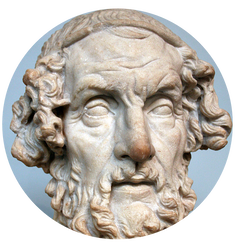Introduction
One of the oldest extant works of literature, The Odyssey (c. 800 B.C.) is one of two Greek epic poems attributed to Homer. Set ten years after the fall of Troy, the poem describes the wanderings and adventures of King Odysseus, as he tries to make his way home to the island of Ithaca following the Trojan war, which Homer addressed in The Iliad. Along the way he encounters an array of colourful, lively and sometimes terrifying characters, from the amorous goddess Calypso to the murderous and bloodthirsty Cyclops.
Recommended Reading
Prose: Homer, The Odyssey (Oxford World’s Classics), trans. by Walter Shrewing, Oxford University Press, 1998
Verse: Homer, The Odyssey, trans. by Robert Fagles, Penguin Books, 1997
To download a short excerpt, please click on the link below:
Recommended Reading
Prose: Homer, The Odyssey (Oxford World’s Classics), trans. by Walter Shrewing, Oxford University Press, 1998
Verse: Homer, The Odyssey, trans. by Robert Fagles, Penguin Books, 1997
To download a short excerpt, please click on the link below:
| fypa3odyssey.pdf | |
| File Size: | 65 kb |
| File Type: | |
Questions for Reflection and Discussion
What role does pilgrimage - leaving home and returning after making a formative journey - play in the text?
What motivates the characters? What can this tell us about the deeper longings of human beings?
How do Odysseus and other characters relate to the gods? Is this significant? Why or why not?
What motivates the characters? What can this tell us about the deeper longings of human beings?
How do Odysseus and other characters relate to the gods? Is this significant? Why or why not?
“Athene, her eyes flashing bright, exulted, “Father, son of Cronus, our high and mighty king! If now it really pleases the blissful gods that wise Odysseus shall return—home at last— let us dispatch the guide and giant-killer Hermes down to Ogygia Island, down to announce at onceto the nymph with lovely braids our fixed decree: Odysseus journeys home—the exile must return!”



